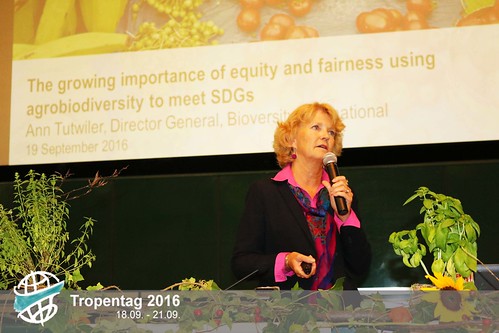Reply to comment
First Words from Tropentag 2016 Keynote Speakers
Mon, 09/19/2016 - 19:00 — Elsby“Population is rising, and we must therefore produce more.” – Michael Hauser, this year’s keynote session moderator.
Tropentag 2016 kicks off with keynote speeches from three prestigious experts in the world of food security and science. These speakers set the tone for the conference and give the first insights into this year’s topic: solidarity in a competing world – fair use of resources. This is an exciting opportunity to hear words from experts and scientific contributors from around the globe, including Italy (and the United States), Thailand, and Nepal!
Ann Tutwiler is the Director General of Bioversity in Italy, with a career that spans nearly 30 years with professional contributions around the world. Ann’s presentation focused on her involvement with conserving and sharing genetic biodiversity amongst the world’s crop producers and shareholders, with an emphasis on “how to deal with genetic resources in a fair and equitable manner”. Studies have shown that as the availability of food diversity increases in a population, the incidence of malnourishment, food waste, low weight, and stunting decreases. This shows the importance of dispersing the wealth of genetic diversity present around the world to developing countries and communities. Collaboration between farmers, researchers, breeders, and policy makers will help to diversify crops with preferable traits such as drought and cold tolerance.
Of particular interest is the ongoing Cacao project (Bioversity), which is helping to diversify and protect this important crop. As 95% of the global cacao supply is produced by smallholder farmers, it is an important resource to protect against climate change and diseases. Bioversity hopes to encourage a philosophy of “getting out of the lab” and exchanging information on disease resistance and other desirable traits and genetic crop diversity amongst global cacao producers.
Ann Tutwiler departed from the session with this final thought: “Solid and lasting results take time, respect, and trust between partners. Despite being pressured by funders for rapid results, it is important to build trust and partnerships over time.”
Poonpipope Kasemsap, the Chair of the International Biology Olympiad, from Kasetsart University in Bangkok, Thailand, has expertise in climate change, horticulture, and crop physiology. His speech had an optimistic tone, with repeated themes around the idea that “in a crisis, be aware of the danger, but also opportunity”. He addressed the fact that as climate change poses a danger to global survival, it also offers the chance for humans to adapt, respond, and rise to this challenge, with innovations taking place in energy sources and other areas of resource management. Specifically, solar energy technology is rapidly improving, offering a cheap alternative to fossil fuel energy. He also noted the agricultural innovation showcased in the use of a “pay per use” irrigation system which is powered by a portable solar pump.
Poonpipone closed his session with words on the importance of youth for the scientific future, as well as a quote from Gandhi: “we have to be the change we wish to see in the world”.
David Molden, the Director General of the International Centre for Integrated Mountain Development in Nepal has a background in resource conservation and a focus on integrating social, technical, and environmental aspects of conservation strategies. His presentation had an evident emphasis on mountain communities, which he believes are some of the most unfortunate bearers of climate change consequences. For example, as mountainous habitat is destroyed or degraded for hydropower projects, lowland communities experience the benefits while mountain communities bear the burden and environmental destruction.
David commented frequently that solidarity will absolutely be necessary for preserving mountain-dwelling communities as they try to adapt to challenges associated with climate change, urbanization, and globalization. David’s takeaway message was clear and reiterated: solidarity must be prioritized in order to support fragile mountain environments during times of climate adaptation and other challenges. He believes that “research creates solidarity…and climate change brings together solution-makers”.
Be sure to attend Wednesday’s closing session to hear further words from the event’s final three keynote speakers: Edith Fernandez-Baca, Andre Leu, and Josiane Nikiema. Also visit Tropentag’s official website for more information on the speakers’ backgrounds: http://www.tropentag.de/conference/speakers.php







